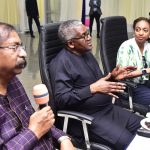Fleeing for His Life: Nigerian Political Organizer Seeks saftey, After Surviving Assassination Attempts”

By our Correspondent
For Ayodele Adeleke Banjo, a grassroots political organizer from Lagos, Nigeria, the price of democracy became personal. What began as civic duty turned into a deadly game of survival.
Banjo’s story is a sobering account of how political participation in Nigeria can turn perilous—especially when it challenges the ruling elite.
Born on February 25, 1983, Banjo hails from Ijebu Ode in Ogun State. He spent most of his adult life in Shomolu, Lagos State. Though his formal education ended at Howells Memorial Grammar School in 2001, he found purpose as a skilled operator of Heidelberg offset printing machines—building a successful career as a professional printer.
Beyond his trade, Banjo developed a strong interest in community development. he became a social person who engages in grassroots management. The elders in his community had faith in his undoubted abilities.
It was notably remarked by our correspondent that the trust he earned from his community ushered him into local politics, where he embraced the ideals of transparency, internal democracy, and service. It was no surprise that he found his political home in Nigeria’s Labour Party (LP)—a party seen by many youths as a fresh alternative to the entrenched All Progressives Congress (APC).
Banjo rose quickly within the ranks, eventually becoming the Party’s Welfare Secretary for Eti-Osa Local Government. In early 2023, he was instrumental in mobilizing support for LP House of Representatives candidate Hon. Thaddeus Attah, who defeated the APC incumbent in what many considered an electoral upset in a traditionally APC stronghold.
“The victory of LP in Eti-Osa was not an accident, “It was the result of sleepless nights, street-to-street engagement, and a passion for real change.”
It was recalled, that Banjo’s troubles started immediately after the February 25, 2023 election. The APC, especially some members loyal to powerful interests, felt humiliated by the outcome. They believed that Banjo’s involvement was a major reason for their defeat.”
Our Staff Reporter gathered that he began receiving anonymous threats, warnings, and unsettling messages suggesting he should watch his back. At first, he thought they were empty political grumblings. Then came the attack.
On May 25, 2023, at around 11 p.m., when Banjo returned home from work. As he approached his compound, he noticed a man attempting to force his way through the gate.
We learnt that he challenged the intruder, thinking it was a random thief,”. “But before he could act further, four more men attacked him from different directions according to an eye witness who gave a vivid account. It was clearly a coordinated attack.
It was at the instance of one of his neighbours, a retired soldier known as “Old Soldier” who heard the commotion and rushed to the scene. The attackers fled, but not before leaving Banjo with injuries.
The trauma was immediate. Fearing more attacks, we learnt Banjo relocated his wife and children to Ijero, Ekiti State—his wife’s ancestral village. “he had no choice. Their safety was more important,” recalled by our reporter.
On May 27, the case was filed and formally incidented at Pedro Police Station in Shomolu. Initially met with delays, the police eventually registered his case but offered no concrete protection.
“Days passed, and there was no progress. It was discovered that he returned to the station only to be told indirectly that the case was too sensitive. An officer, as we learnt quietly advised him to leave the area for his safety,”
The reason for the attack was not unconnected to the just concluded electioneering process at that time. The attackers were allegedly connected to powerful individuals within the ruling party.
We were told the Police could do nothing since the people he had issues with belonged to the APC, which controls the Lagos State government and the federal government.
With nowhere else to turn, Banjo left Shomolu for his hometown of Ijebu Ode, hoping the threats would die down. But even there, safety proved elusive.
“Some unknown men came looking for him. One of them, who seemed familiar with his father’s name, told him plainly—‘You need to leave this country. They will find you no matter where you run.’” the source said.
It was learnt that the warning shook Banjo to his core. His mental health has suffered. Nightmares of the attempted assassination, coupled with ongoing fear for his family’s safety.
Banjo’s case raises wider questions about political tolerance and protection for opposition voices in Nigeria. While his story is personal, it is not isolated. Human rights groups have long raised concerns about political violence, intimidation, and lack of police neutrality in the country—especially during election seasons as the story underscores the urgent need for systemic reforms—not only in how elections are conducted but in how political actors are protected. As Nigeria continues its journey toward democratic maturity, it must reckon with the reality that some of its citizens are paying the ultimate price for simply participating.
As Nigeria continues to grapple with democratic consolidation, Banjo’s story stands as both a warning and a cry for help: that in the heart of Africa’s largest democracy, the cost of civic engagement may be life itself.





Leave a Reply